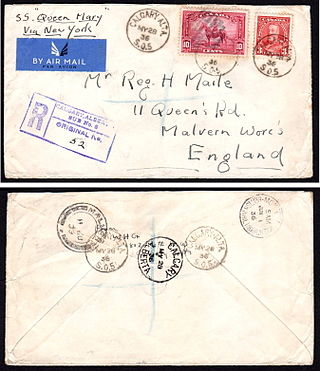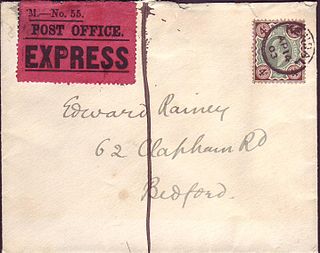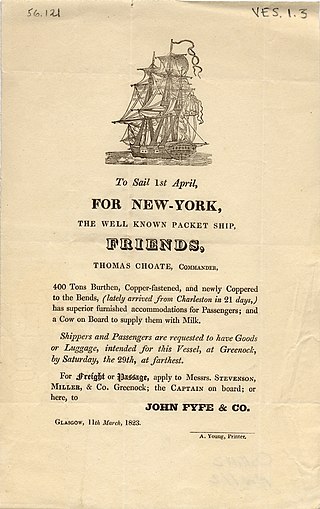
The United States Postal Service (USPS), also known as the Post Office, U.S. Mail, or simply the Postal Service, is an independent agency of the executive branch of the United States federal government responsible for providing postal service in the United States, its insular areas and associated states. It is one of a few government agencies explicitly authorized by the Constitution of the United States. As of 2023, the USPS has 525,469 career employees and 114,623 non-career employees.

Postal history is the study of postal systems and how they operate and, or, the study of the use of postage stamps and covers and associated postal artifacts illustrating historical episodes in the development of postal systems. The term is attributed to Robson Lowe, a professional philatelist, stamp dealer and stamp auctioneer, who made the first organised study of the subject in the 1930s and described philatelists as "students of science", but postal historians as "students of humanity". More precisely, philatelists describe postal history as the study of rates, routes, markings, and means.

China Post, officially the China Post Group Corporation, is the national postal service corporation of the People's Republic of China. It is incorporated as a state-owned enterprise.

Airmail is a mail transport service branded and sold on the basis of at least one leg of its journey being by air. Airmail items typically arrive more quickly than surface mail, and usually cost more to send. Airmail may be the only option for sending mail to some destinations, such as overseas, if the mail cannot wait the time it would take to arrive by ship, sometimes weeks. The Universal Postal Union adopted comprehensive rules for airmail at its 1929 Postal Union Congress in London. Since the official language of the Universal Postal Union is French, airmail items worldwide are often marked Par avion, literally: "by airplane".

An airmail etiquette, often shortened to just etiquette, is a label used to indicate that a letter is to be sent by airmail.

Dead letter mail or undeliverable mail is mail that cannot be delivered to the addressee or returned to the sender. This is usually due to lack of compliance with postal regulations, an incomplete address and return address, or the inability to forward the mail when both correspondents move before the letter can be delivered. Largely based on the British model that emerged in the late eighteenth century, many countries developed similar systems for processing undeliverable mail.

Registered mail is a postal service in many countries which allows the sender proof of mailing via a receipt and, upon request, electronic verification that an article was delivered or that a delivery attempt was made. Depending on the country, additional services may also be available, such as:
Poste restante, also known as general delivery in North American English, is a service where the post office holds the mail until the recipient calls for it. It is a common destination for mail for people who are visiting a particular location and have no need, or no way, of having mail delivered directly to their place of residence at that time.

The system for mail delivery in the United States has developed with the nation. Rates were based on the distance between sender and receiver in the nation's early years. In the middle of the 19th century, rates stabilized at one price regardless of distance. Rates were relatively unchanged until 1968 when the price was increased every few years by a small amount. Comparing the increases with a price index, the cost of a first-class stamp has been steady. The seal of the Post Office Department showed a man on a running horse, even as railroads and, later, motorized trucks and airplanes moved mail. In 1971, the Post Office became the United States Postal Service, with rates set by the Postal Regulatory Commission, with some oversight by Congress. Air mail became standard in 1975. In the 21st century, prices were segmented to match the sorting machinery used; non-standard letters required slightly higher postage.

Express mail is an expedited mail delivery service for which the customer pays a premium for faster delivery. Express mail is a service for domestic and international mail, and is in most nations governed by the country's own postal administration. Since 1999, the international express delivery services are governed by the EMS Cooperative.

Generally, packet trade is any regularly scheduled cargo, passenger and mail trade conducted by boat or ship. The boats or ships are called "packet boats or packet ships" as their original function was to carry mail.

Military mail, as opposed to civilian mail, refers to the postal services provided by armed forces that allow serving members to send and receive mail. Military mail systems are often subsidized to ensure that military mail does not cost the sender any more than normal domestic mail. In some cases, military personnel in a combat zone may post letters and packages to their home country free of charge. Modern military mail services are provided by most armed forces around the world. In some nations, individual service branches may run their own military mail program.

Parcel post is a postal service for mail that is too heavy for normal letter post. It is usually slower than letter post. The development of the parcel post is closely connected with the development of the railway network which enabled parcels to be carried in bulk, to a regular schedule, and at economical prices. Today, many parcels also travel by road and international shipments may travel by sea or airmail.
Surface Air Lifted (SAL) is a postal service used to send international mail items. Thirty-nine postal authorities provide this service. It is a cost-effective international mail. At first SAL mail is processed and transported by surface in the origin country. Then it is transported by air to the destination country and finally processed and delivered as standard-type mail by the destination postal administration. The service is faster than surface mail while the cost is lower than air mail. SAL is more economical for sending heavy items; with light items, it sometimes costs more than air mail.
National Change of Address (NCOALink) is "a secure dataset of approximately 160 million permanent change-of-address (COA) records consisting of the names and addresses of individuals, families and businesses who have filed a change-of-address with the USPS". It is a postal address verification system maintained by the United States Postal Service, and access to it is licensed to service providers and made available to mailers. There are six licenses available including Full Service Providers and Limited Service Providers. The use of NCOALink is required in order to obtain bulk mail rates, as it minimizes the number of UAA mailpieces saving the mailer money and reducing the USPS's processing of this type of mail.
A Nixie is a name given by the United States Postal Service to a piece of mail which is undeliverable as addressed. It is derived from "nix", English slang for the German nichts ("nothing"), and "-ie", an item or a thing.

Package tracking or package logging is the process of localizing shipping containers, mail and parcel post at different points of time during sorting, warehousing, and package delivery to verify their provenance and to predict and aid delivery.
A network distribution center (NDC) was a highly mechanized mail processing plant of the United States Postal Service that distributed standard mail and package services in piece and bulk form. The NDC network was dismantled in 2022-2023 by the USPS as part of Postmaster General Louis DeJoy’s Delivering for America network rationalization plan, which saw mail classes formerly handled by the NDC network merged into mailstreams in processing and distribution centers. Each former NDC, all of which were located in buildings owned by USPS, are implementing or in the process of creating individual plans for repurposing the buildings. Many are being restacked into RPDCs, which will form the backbone of the new USPS network, whereas others are being used to insource previously outsourced transportation functions such as surface transfer centers (STCs), or terminal handing services (THS), which handled airmail, in addition to continuing to support processing and distribution centers with the handing of priority and ground advantage parcels.
Shipping insurance is a service which may reimburse senders whose parcels are lost, stolen, and/or damaged in transit.

The United States Postal Service (USPS) provides Priority Mail Express for domestic U.S. delivery, and offers two types of international Express Mail services, although only one of them is part of the EMS standard. One is called Priority Mail Express International and the other service is called Global Express Guaranteed (GXG). The latter has no relation to "EMS" International service as provided by the EMS Cooperative.















